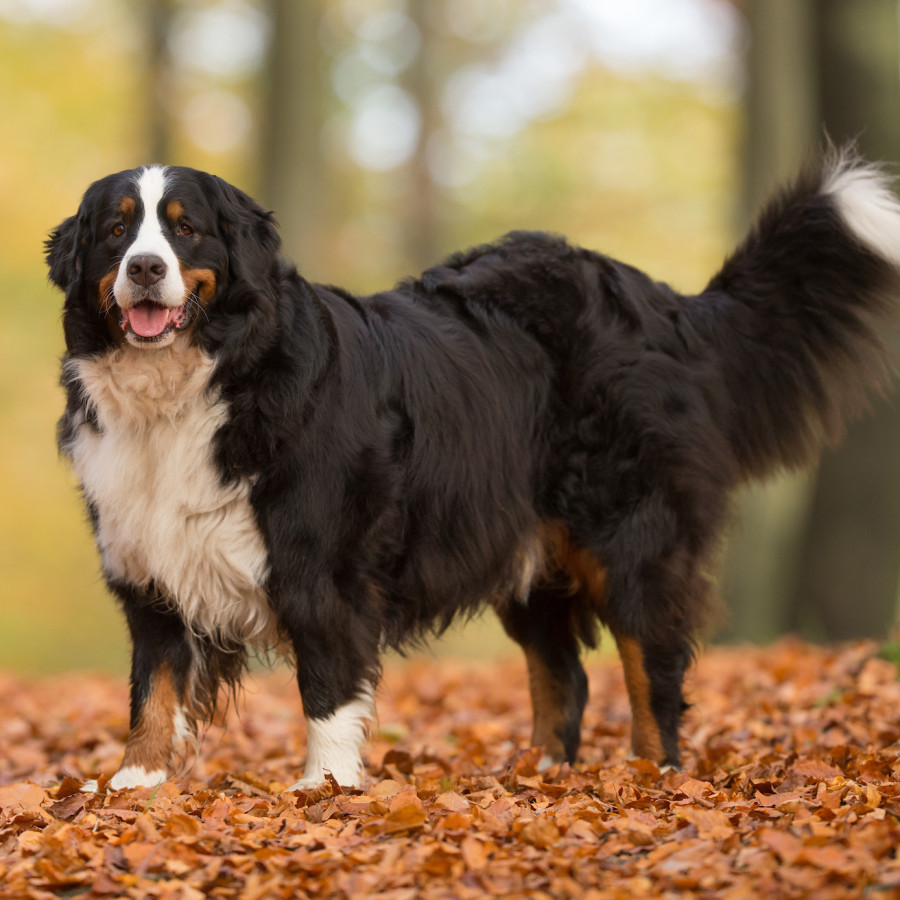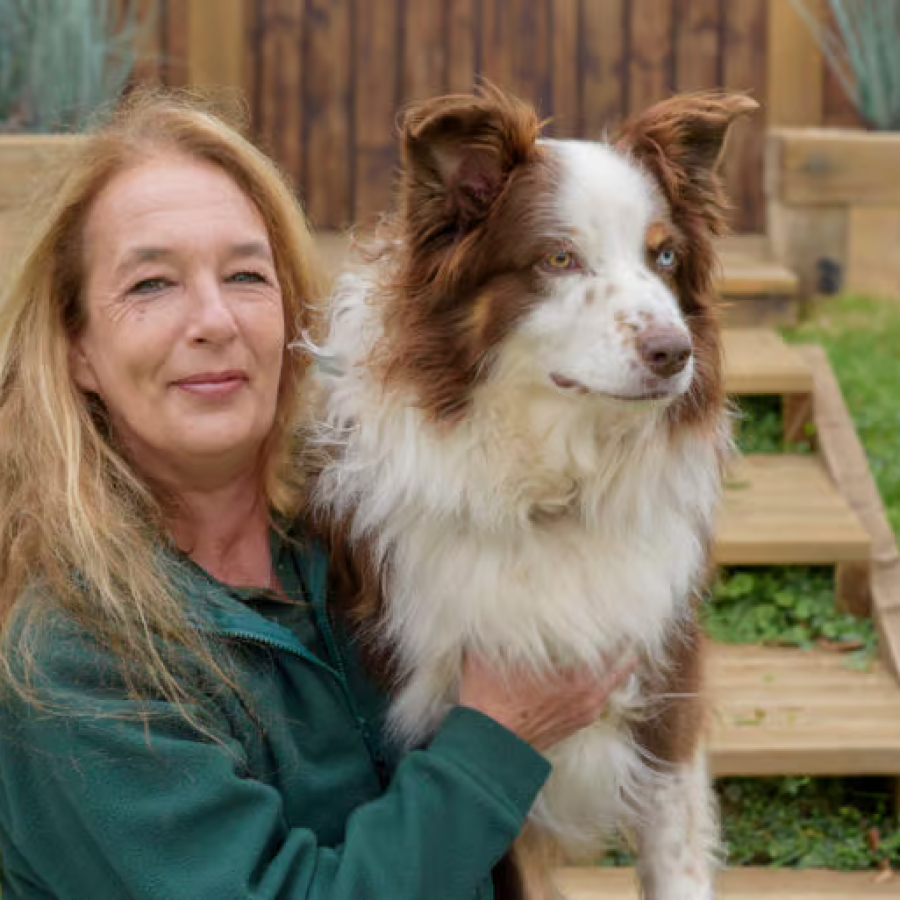
Bernese Mountain Dog Breed
Bernese Mountain Dogs are strikingly big, snuggly and smart… and extra slobbery!

Bernese Mountain Dogs are strikingly big, snuggly and smart… and extra slobbery!
The eye-catching Bernese Mountain Dog, also known as the Berner, is a large, heavy-coated, working breed originating from the Swiss Alps where they were used to guard farmers’ flocks.
This powerful breed needs plenty of space and owners who understand that they have a lifespan of up to just eight years.
Some Berners can be reserved with strangers, but they’re affectionate and loyal to their families.
As youngsters, they’re goofy and active, but as they grow up, they become more laid-back.
If they’re well-socialised (meaning they learn about people and animals in the right way), then Berners are good-natured and gentle. However, they can be protective of their family and property.
Owners need to take socialisation and training seriously as Berners are big dogs who were bred to work. You know what they say… work a dog or it will go self-employed!
Disclaimer
While these breed traits give a general idea of what to expect from a specific type of dog, it's important to remember that every dog is unique. Just like people, each dog comes with their own distinct personality, quirks, and characteristics!

They certainly are. They just love to be with their people. If you don’t want a huge, drooling shadow following you around, a Berner may not be the best choice!
Berners enjoy physical contact as long as it’s not too warm, as they struggle in the heat.
However, they can be unsure of strangers, so they shouldn’t be pressured or expected to interact with people they don’t know.
Young and adolescent Berners are very playful for their size and bulk. They’re wonderfully silly up until at least three years old.
But this means you may find yourself with a big dog who likes doing zoomies indoors… a recipe for chaos in a smaller home!
They’re entertaining pups and would be great fun for kids old enough to play with them along with active adults.
Berners need to learn about the world, environment, people, and animals in the right way. Habituation (teaching a pup to ignore things around them and focus on their owner) and socialisation (knowing environmental factors are okay and safe to interact with) are essential to bringing out the best in these wonderful dogs!
This is a vital step to helping them stay happy. If it’s missed or not done well, they can show fear-based aggression. For a big dog like a Berner, this is very serious.
Berners can cope home alone for a few hours but only if they’re trained in a supportive way. Their strong loyalty is great, but it also means they can struggle when there’s nobody around… and when a big dog struggles, they can make a lot of noise and/or damage.
Berners are strong, so teaching them to walk on a loose lead is essential! They’re so strong that they used to work pulling carts on Swiss farms. Now some do it for recreation.
Space! Berners are large dogs that take up a lot of room, and they’re especially energetic as puppies. They need to be able to stretch out and move around. You don’t want to be stepping over or around them all the time!
A spacious garden is also beneficial so that they can have a good runabout at home.
Owners need to consider the size of their vehicle when it comes to taking a Berner out and about.
Remember, these dogs were bred to work long hours outside in the mountains, so they will need access to open spaces.
With the right training and support, Berners can live happily alongside other animals, but some males struggle to live alongside other males. So, opposite-sex mixes are best. If you’ve met a Berner before, you’ll know they’re big droolers. You’ll need a towel at the ready in every room to stop it from flying everywhere when they shake their head!
Puppyhood aside, Berners need at least two good walks a day up to around four years of age. As they get older, you'll find they may start to slow down and won’t need as much exercise.
They enjoy long, gentle hikes and the opportunity to stretch their legs.
Playing with toys is an excellent way of exercising both their bodies and their minds.
Berners aren’t the best swimmers, but paddling in shallow water is good for their joints.
They also enjoy digging, especially if it’s hot, as the ground below the surface is cooler. Giving them a dig pit is another great way to exercise their legs.
It’s important to remember that Berners come from the Swiss mountains where it is cold and snowy. They cannot cope with hot weather. Walks should be early and late in the day in warmer temperatures.
All puppies need to learn how to be around people, pets, and other dogs, calmly and politely (known as socialisation). They also need help to feel calm, comfortable, and confident in everyday situations like travelling, the sound of traffic, and being in busy places (known as habituation). This is essential to prevent tricky behavioural problems in the future, and you'll be off to a great start with your ongoing training.
Because of their history as working dogs, Berners are very able and willing to learn.
Like other giant breeds, they don’t hit full maturity until they’re four years old. This means that the challenges of growing up last longer than in smaller breeds. But it’s not all bad news! With youth comes the enthusiasm to learn.
Start with getting them used to interacting safely with other people, animals, and the world around them as early as possible.
Basic manners, loose lead walking and keeping all four feet on the ground should also be covered early on. No one wants to be jumped on by a big Berner!
Lots of breed enthusiasts train their Berners to pull carts, as they would’ve done in the mountains.
Keeping your Berner’s mind and body busy will help them be a wonderful companion for you.
Berners are moderate to heavy shedders.
Be aware that their size and thick coat mean that grooming is not a five-minute job. Owners need to allow plenty of time for this!
They’re double-coated, with a topcoat and an undercoat. Their topcoat can be kept clean and tangle-free by using a brush called a slicker brush. Their undercoat requires a rake brush to remove the dead hair.
A comb can be used on the feathering (longer flowing hair) along the back of their legs and around their ears.
Berners are prone to overheating so removing as much dead hair from the undercoat as possible during warmer months will not only mean you have to vacuum less, but it’ll also make your dog feel much more comfortable.
Scissors should be used to keep the hair between the pads short to reduce the risk of grass seeds penetrating the skin.
Berners have quite a short lifespan of up to just eight years.
They’re prone to several different types of cancer that are life-limiting.
They can also suffer from both hip and elbow dysplasia, where the joints don’t develop as they should.
Renal failure, kidney disease and eye problems are also health concerns for this breed.
Berners are prone to a very serious condition called Gastric Torsion, also known as Bloat, which affects their stomachs. Giant breeds and deep-chested breeds are most at risk of this condition, but owners of all breeds should be aware of it.
I need two good walks a day – at least 1.5 to 2 hours of outdoor fun. I’m a working breed, so I need to exercise my brain, too. I love to play with my toys and my family.
I was born to work, but not everyone has a farm! I like to please my humans and use my brain. Food-based activities at mealtimes and playing with toys will keep me happy.
Socialisation and habituation training (learning about the world in the right way) are top priorities.
I’m a big dog, so I need to be taught basic obedience exercises like loose lead walking, and sit and stay.
You can expect to pay in the region of £2,500 for a puppy who comes from a breeder who carries out certain health tests.
Health testing can’t completely rule out the conditions that threaten this breed, but it gives you a head start. The set-up costs for any puppy can be up to several hundred pounds. This includes food, bowls, beds, bedding, toys, collars, leads, a harness, puppy pens, and baby gates, amongst other things.
Ongoing costs include: food, vaccinations, parasite control, and health insurance premiums
That all-important health insurance is a necessity but will cost considerably more than for most other breeds.
Take our quiz to discover which breed is right for you
Take our quizPlease call our pet support line on 0300 303 9333 (7 days a week – 8.30am - 4pm)